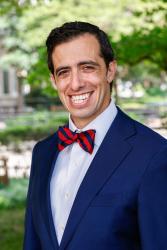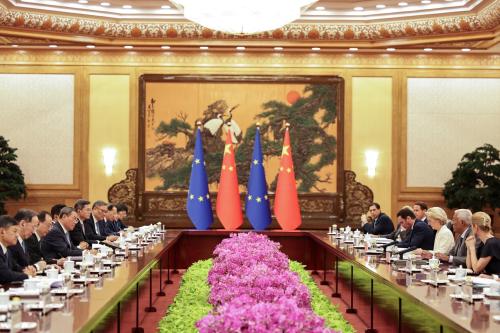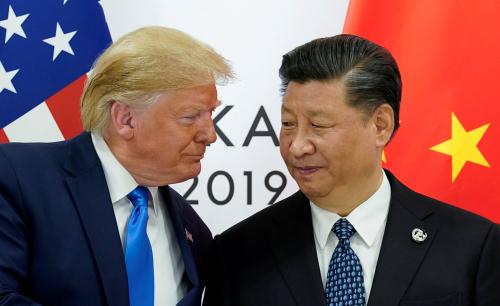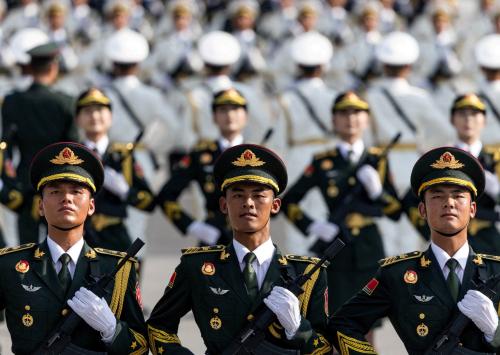This piece was updated on October 14 to correct a detail about how alternate Central Committee members become full members.
From October 20 to 23, the Central Committee of the Chinese Communist Party (CCP) will convene in Beijing for its annual plenum, the most important event in China’s political calendar this year. This meeting will focus on outlining the CCP’s next five-year plan, which the National People’s Congress—China’s rubber-stamp legislature—will approve in March 2026. The plenum may also see important personnel moves.
What is a plenum, and why does it matter?
A plenum is a convocation of the Chinese Communist Party Central Committee, which comprises the party’s top 205 officials, plus 167 alternate members. The Central Committee is nominally the highest authority in the CCP, and is charged with selecting members of the party’s Politburo, Politburo Standing Committee, and Central Military Commission, according to the CCP Constitution. This Central Committee, in turn, was selected by the 2,296 delegates to the 20th Chinese Communist Party Congress, which occurs every five years and is the preeminent event in Chinese politics. The political reality, however, is just the opposite—in fact, the party’s seniormost leaders determine the composition of the broader Central Committee through an opaque process of backroom negotiations.
Since 1982, the CCP Constitution has required the Central Committee to meet at least once a year. This rule was part of an attempt to introduce some predictability and stability to Chinese policymaking after Mao Zedong’s erratic rule, during which the Central Committee would go years without convening. Prior to the Xi Jinping era, the CCP’s leadership had settled into a predictable—but unwritten—cadence for party plenums. According to the informal norms that previously governed the political calendar, the Fourth Plenum should focus on issues related to party governance, an issue that is central to Xi’s rule. However, this Fourth Plenum will primarily focus on economic work and the formulation of the 15th Five-Year Plan—which will begin next year. The shift in focus is a major deviation in China’s post-Mao political calendar. The decision to skip, for now at least, a plenum focused on party building is particularly puzzling since Xi has focused so relentlessly on this issue throughout his tenure.
While plenums still remain significant, Xi has diminished their relative importance by occasionally scheduling other semi-regular conferences that can play an outsized role in signaling the leadership’s priorities. For example, in 2023, Xi postponed the party’s Third Plenum—which traditionally focuses on economic issues—until July 2024, and instead convened a rare Foreign Affairs Work Conference. Prior to Xi’s tenure, the party’s leadership convened a Foreign Affairs Work Conference around historic shifts in Chinese foreign policy, with three occurring between the establishment of the People’s Republic of China in 1949 and the start of Xi’s rule in 2012. During his tenure alone, Xi has personally hosted three Foreign Affairs Work Conferences—a remarkable shift in China’s political calendar. Similarly, Xi has convened two Political Work Conferences for the military leadership during his tenure, in 2014 and again in 2024, both of which presaged extensive and consequential purges of the military high command. These alterations to the political calendar provide yet another marker of how Xi has used his power to reshape the informal rules of Chinese politics.
What outcomes should we watch for at the plenum?
Key themes of the 15th Five-Year Plan (2026-2030)
The Politburo’s July announcement that it would convene the full Central Committee in October stated that the plenum would focus on the 15th Five-Year Plan (FYP), which will guide China’s economic and social development from 2026 to 2030. During the next FYP, the People’s Republic of China will celebrate its 80th anniversary in 2029—which is when the party’s “reform tasks” must be complete, according to Xi. In April, Xi outlined the following five key areas of development for the next FYP:
- Economic development.
- Security.
- National innovation system.
- Education and talent for the development of new quality productive forces.
- Improvement of people’s livelihoods.
Continued focus on “new innovative forces”
Innovation and developing new quality productive forces were the focal points of Xi’s speech at the April symposium on the 15th FYP; Xi’s subsequent essays on the 15th FYP in Qiushi, the Chinese Communist Party’s leading theoretical journal; and the readout of the September Politburo meeting. Xi, in his April symposium speech, called on officials to expand China’s opening up to the outside world in light of a rapidly changing external environment, likely an oblique reference to the fluctuating U.S. tariff regime. He called for improving the national innovation system, stimulating the vitality of innovators, and developing emerging and “cutting-edge” technologies, with education as key to their development. Science and technological innovation were also listed as the second of five main initiatives in the National People’s Congress (NPC) Standing Committee’s special research report on the 15th FYP, ahead of expanding domestic demand.
This language and policy framing likely means that the 15th Five-Year Plan will broadly be a continuation of the 13th and 14th FYPs, with domestic innovation as its core “pillar concept.” The 13th FYP (2016-2020) followed the launch of the “Made in China 2025” strategic plan and featured a strong focus on R&D spending and cultivation of high-tech sectors like artificial intelligence (AI), robotics, high-speed rail, and semiconductors. The 14th FYP similarly focused on innovation—as its central theme was “dual circulation,” a strategy that, in short, calls for strengthening domestic demand while maintaining global trade—and also highlighted technological self-reliance through the development of emerging technologies like AI, renewable energy, and semiconductors.
The 15th FYP is likely to retain many of these priorities and further emphasize developing new productive forces, including the means to develop new technologies—infrastructure, R&D, and talent integration—and the technology itself. On at least three occasions in the past year, Xi has made it clear that he views science and technological innovation of new productive forces as the drivers to develop China’s economy, especially amid unpredictable U.S.-China economic relations.
An unclear path toward boosting consumption
Consumption is likely to be a nominal focus in the 15th Five-Year Plan, especially given the government’s continued attention to boosting consumption in 2025, but the key indicator of the leadership’s seriousness will be whether the five-year plan moves beyond rhetoric to present a viable plan to boost consumption. As China’s economy developed and the need for housing and infrastructure declined, many economists, such as Andrew Polk and Dinny McMahon, judged that household consumption was necessary to replace investment and drive domestic demand. Since China began experiencing slower growth following the end of its “zero-COVID” policy, Xi and senior Chinese officials have prioritized domestic consumption. Xi discussed this prioritization in a speech at the Central Economic Work Conference for 2025 and the July Politburo symposium on economic work, but recent policy changes have also signaled that the focus on consumption will continue; for example, the State Council launched a new policy in August 2025 to waive care and education fees for preschool students.
Even though the leadership has declared consumption a top priority, China’s economy remains investment-driven as the government continues to pump money into infrastructure, companies, and exports rather than into social services and welfare programs, which would bolster consumption. The social services and welfare programs that the government has enacted have focused on solving China’s demographics problem—like the preschool waiver or a national child care subsidy program—rather than increasing household spending per se. Notably, Xi also did not explicitly mention consumption in his April speech on the five-year plan, but only alluded to it when he called for “improving livelihoods”—which could mean support for social welfare mechanisms to increase consumption. Yet, the NPC Standing Committee report on the 15th FYP did outline several initiatives to increase consumption, including enhancing consumer capacity, coordinating consumer policies and measures, increasing effective supply, safeguarding development through the rule of law, and establishing reasonable economic growth targets. Of these proposed policies, only efforts to enhance consumer capacity would directly increase household spending levels, though the report did not itemize specific measures to implement the policy.
Personnel changes
Xi could use the plenum to make some high-level personnel moves, but he only needs the imprimatur of a plenum to make changes to the party’s top bodies—the Politburo, Politburo Standing Committee, and the Central Military Commission. Beyond selecting members for those august bodies, Xi has wide latitude to make other personnel changes at any time outside of a plenum. Xi could use the plenum to repopulate the depleted ranks of the Central Military Commission, the party’s supreme military body, which has seen three of its six uniformed members removed or go missing since the start of Xi’s term. As Brookings scholars Jonathan Czin and John Culver have argued in Foreign Affairs, the widespread purges among the high command suggest that Xi has lost his patience with—rather than his control over—the military, and that he lacks confidence that the military would be up to the task of guaranteeing the party’s rule or, in Xi’s parlance, the ability to “fight and win battles.” Some have speculated that Xi could use the plenum to maneuver a potential successor into one of the party’s top bodies, but Xi is likely to defer this issue at least until 2027, when he will, in all likelihood, begin a fourth term in office.
Military
- The most likely vacancy that the leadership might fill at the plenum is the director of the Political Work Department, whose erstwhile leader, Admiral Miao Hua, was removed last November. The Political Work Department is a crucial institution in the People’s Liberation Army (PLA), since it is responsible for ensuring the military’s fealty to the party. Miao has thus far been removed from his position as a deputy to the NPC, which clears the way to remove him from the Central Committee during this upcoming plenum. We do not know who would replace Miao, but unless Xi decides to give a “helicopter promotion” to a less senior officer, he would have to choose a political commissar at the theater command leader grade. The possible options include:
- Eastern Theater Political Commissar Liu Qingsong.
- Southern Theater Political Commissar Wang Wenquan.
- Central Theater Political Commissar Xu Deqing.
- PLA Navy Political Commissar Yuan Huazhi.
- PLA Air Force Political Commissar Guo Puxiao.
- PLA Rocket Force Political Commissar Xu Xisheng (though Xu is rumored to be under investigation for corruption).
Western Theater Political Commissar Li Fengbiao has already hit the 65-year-old retirement age and is likely ineligible for promotion.
- Although Central Military Commission (CMC) Vice Chairman General He Weidong has not been seen since March, he has not formally been removed from his position, so the leadership is unlikely to replace him at this plenum.
- Xi is also unlikely to elevate the current minister of national defense, Admiral Dong Jun, to the CMC. Dong has been the defense minister since 2023, and therefore, Xi already had an opportunity to elevate him to the CMC last year. Moreover, Dong has not even been made a state councilor, a position that his predecessors held—suggesting that Xi has decided to further diminish the already enfeebled post of minister of national defense, the only ministerial position in China’s system that has no vice ministers.
- Over the course of Xi’s third term, at least seven PLA officers on the Central Committee (former Southern Theater Commander Wang Xiubin, former People’s Armed Police Commander Wang Chunning, former Northern Theater Commander Wang Qiang, former PLA Army Political Commissar Qin Shutong, former CMC Logistics Support Department Head Zhang Lin, former PLA Rocket Force Political Commissar Xu Zhongbo, and former Commander of the PLA Strategic Support Force Ju Qiansheng) have been dismissed from their positions, or replaced, but not reassigned nor put under investigation. Five of these PLA officers were removed from their positions since the last plenum. Aside from He Weidong, there are several others who are rumored to be investigated or arrested based on connections to Miao Hua and He Weidong, but these rumors remain unsubstantiated and are therefore unlikely to directly affect the plenum’s proceedings.
Party
- The party has an unusual number of Central Committee members awaiting reassignment, but Xi has the latitude to reassign top officials outside of a plenum. The most notable official currently in limbo is Politburo member Ma Xingrui, who until July served as party secretary of the Xinjiang Uyghur Autonomous Region, but so far, there is no indication that Ma is in political trouble.
- Four other Central Committee members have been removed their positions and not yet reassigned since the last plenum, including Jin Zhuanglong as minister of industry and information technology, Wang Guanghua as minister of natural resources, Lan Fanpei as chairman and secretary of the Party Committee of China Shipbuilding Industry Corporation, and Liu Jianchao as minister of the International Liaison Department of the CCP Central Committee, who has been rumored to be under investigation and was replaced last month by Liu Haixing.
The number of officials awaiting reassignment could simply reflect possible disarray at the Organization Department, which was not fully staffed until late September 2025, when Huang Jianfa was promoted to the deputy minister in charge of daily affairs. Its previous director, Li Ganjie, was demoted from this powerful position in April 2025 and rotated instead to the United Front Work Department. At the time, rumors swirled that Li was in trouble, but Li accompanied Xi on his tour of Tibet in August 2025, suggesting he may be safe—at least for now.
- Yu Jianhua, party secretary and director general of the General Administration of Customs, passed away “due to a sudden illness” since the last plenum, which means his Central Committee seat will likely need to be filled by an alternate member during this plenum. His position was filled by Sun Meijun, who is an alternate member of the 20th Central Committee. Rumors are also circulating that Central Military Committee Political Work Department Executive Director He Hongjun has died by suicide, which would create another opening to elevate an alternate central committee member, though official media has not announced his demise and the rumors are thus far unsubstantiated.
- Ma Xiaowei, Wang Menghui, Hao Peng, Sun Shaocheng, and Lou Yangsheng have all retired since the last plenum. They will likely stay on as Central Committee members, however, as is tradition.
- There have also been rumors that Xi could use the plenum to recreate the Central Advisory Commission—a vehicle that Deng Xiaoping used to ease his fellow party grandees into retirement—but that seems unlikely. However, Xi lacks a compelling political rationale for revivifying this body, or something akin to it, since Xi’s closest associates already serve alongside him on the Politburo Standing Committee and the oldest among them are not due to retire until 2027—and even then, Xi could elect to keep them in power. Moreover, Xi spent much of his first two terms eviscerating the power of previous generations of party elders, a dynamic perhaps best symbolized by the remarkable eviction of Xi’s elderly and visibly unwell predecessor, Hu Jintao, from the last Party Congress in 2022. For now, Xi is unlikely to allow party elders more influence in Chinese politics.
Purges
According to the CCP Constitution, the Central Committee must confirm any decision by the Politburo to discipline a member of the Central Committee at a plenary meeting, including purging a member altogether. Xi’s third term in office has seen a surprising number of high-level purges, especially when one considers that Xi successfully stacked the leadership with his closest associates and installed his own allies in key positions. Rumors continue to swirl around potential purges of a number of other officials, but those rumors are beyond the remit of this piece because the cases are unlikely to have a direct impact on the plenum.
Since the Central Committee last met in July 2024, the following Central Committee members have been disciplined and should be formally dismissed at this plenum.
- Tang Renjian, the former minister of the Ministry of Agriculture and Rural Affairs and Central Committee member, was expelled from the party in November 2024 for “serious violations of discipline and law.” The full Central Committee needs to confirm his dismissal, which will likely occur at this plenum.
- Two alternate members, Zhu Zhisong, former secretary of the Pudong New Area Committee, and Li Shisong, former executive vice governor of Yunnan, have also been expelled from the party for serious violations. The plenum will likely confirm these decisions as well.
- Since the last plenum, at least four other Central Committee members have been placed under investigation, including former Deputy Party Secretary and Governor of Shanxi Province Jin Xiangjun, former Deputy Secretary of the Guangxi Zhuang Autonomous Region Party Committee and Chairman of the Autonomous Region Government Lan Tianli, former Deputy Secretary of the Inner Mongolia Autonomous Region Party Committee and Chairperson of the Inner Mongolia Autonomous Region Government Wang Lixia, and former Chairman of the China Securities Regulatory Commission Yi Huiman. The Politburo needs to review and approve the investigation to dismiss them as Party members. Their dismissal will then be confirmed at the next plenary meeting, which means they will likely not be dismissed until the Fifth Plenum.
Conclusion
Although party plenums have waned in importance as Xi has added other major party conclaves to the political calendar, the coming plenum will nonetheless provide crucial markers of Xi’s intentions for the final two years of his third term—and help him lay the groundwork for his likely fourth term in office, which would start in 2027. The plenum’s prevailing, if unstated, theme is likely to be one of policy continuity, as the likely contours of the 15th Five-Year Plan are likely to comport with Xi’s techno-industrial vision for renovating China’s economy in the wake of the property sector’s collapse. This policy continuity will be juxtaposed with the continued drama of turnover in the party’s seniormost ranks—as some top officials will either be conspicuously absent or have their disgrace affirmed by their erstwhile colleagues in the Central Committee. The two dynamics may seem at odds, but in fact, Xi has used the leadership tumult to sustain his dominance, keep his subordinates on their toes, and bend the largest political party in the world toward his objectives. Xi has also choreographed the plenum so that it will immediately precede the Asia-Pacific Economic Cooperation summit in South Korea, a sequencing of events that would enhance Xi’s aura of authority both at home and abroad if he does in fact attend the summit.
The Brookings Institution is committed to quality, independence, and impact.
We are supported by a diverse array of funders. In line with our values and policies, each Brookings publication represents the sole views of its author(s).








Commentary
Purges, personnel, and policy: a primer on China’s Fourth Plenum
October 13, 2025